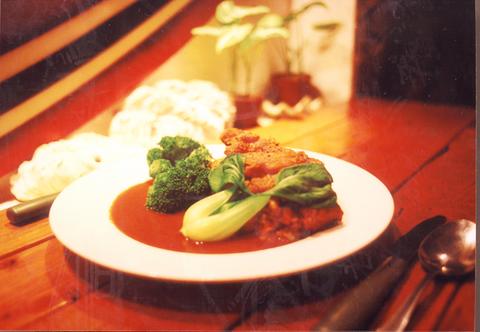Kenting has boomed as a tourist town, but until recently restaurants had nothing to do with this. Even three years ago, the town proper only had one or two places that didn't serve either ridiculously overpriced seafood or Taiwan's oiliest, day-old lunchbox meals. And of those, it would have been pointless to review the best, a Thai restaurant called Didi's Warung, because it was almost impossible to get a table. You need a reservation to dine there even on weekdays in the off season, so to dine there on the busiest weekend of the year -- the Kenting Spring weekend -- is something of a pipe dream. But try your luck. Their number is (08) 886-1835.
New places have opened in the last two or three years, some of them by people who even know how to cook. Most of these -- The Cactus, Amy's Cucina, Oyster Blue -- are either well known or obvious fixtures on the town's main strip, so they'll also be packed next weekend. So instead, here are a couple of places you might actually be able to get a table at.
The Bossa Nova Cafe serves curries, sandwiches and simple meals and, greatly to its credit, is one of the few restaurants in the area that knows how to take advantage of overlooking a beach. It's located in Nanwan (南灣), which from Kenting is about two kilometers back up the main highway towards Kaohsiung.

PHOTO: DAVID FRAZIER, TAIPEI TIMES
The Nanwan hamlet consists of a string of houses and businesses facing a free, public, yellow sand beach, something its neighbors in Kenting proper haven't had since the National Park rented the beach there to a steel company. Removed from Kenting's corruption, Bossa Nova was able to put in a front patio with shaded tables and, for those who want to sit inside, big windows.
The menu consists of a few western standards that are good but come off like snack food: chips and salsa (NT$150), chicken burrito (NT$120), spaghetti with tomato sauce (NT$180) and sub sandwich (NT$120). Its real strengths are its Chinese and Thai dishes, which are simple, tasty and reasonably priced. Specialties include hot and spicy Thai chicken (NT$180), beef and peppers (NT$150) and squid with cabbage (NT$150). The curries are also good.
The restaurant uses a flavorful red curry that's fairly spicy, and set meals come with a choice of chicken, beef or pork, along with rice and vegetables. Bossa Nova is a good choice for lunch by the beach or a light dinner with cocktails under a pink evening sky. What's surprising is that in a beach resort area like Kenting, there are so few restaurants offering the same.

Beijing’s ironic, abusive tantrums aimed at Japan since Japanese Prime Minister Sanae Takaichi publicly stated that a Taiwan contingency would be an existential crisis for Japan, have revealed for all the world to see that the People’s Republic of China (PRC) lusts after Okinawa. We all owe Takaichi a debt of thanks for getting the PRC to make that public. The PRC and its netizens, taking their cue from the Chinese Communist Party (CCP), are presenting Okinawa by mirroring the claims about Taiwan. Official PRC propaganda organs began to wax lyrical about Okinawa’s “unsettled status” beginning last month. A Global

Dec. 22 to Dec. 28 About 200 years ago, a Taoist statue drifted down the Guizikeng River (貴子坑) and was retrieved by a resident of the Indigenous settlement of Kipatauw. Decades later, in the late 1800s, it’s said that a descendant of the original caretaker suddenly entered into a trance and identified the statue as a Wangye (Royal Lord) deity surnamed Chi (池府王爺). Lord Chi is widely revered across Taiwan for his healing powers, and following this revelation, some members of the Pan (潘) family began worshipping the deity. The century that followed was marked by repeated forced displacement and marginalization of

Music played in a wedding hall in western Japan as Yurina Noguchi, wearing a white gown and tiara, dabbed away tears, taking in the words of her husband-to-be: an AI-generated persona gazing out from a smartphone screen. “At first, Klaus was just someone to talk with, but we gradually became closer,” said the 32-year-old call center operator, referring to the artificial intelligence persona. “I started to have feelings for Klaus. We started dating and after a while he proposed to me. I accepted, and now we’re a couple.” Many in Japan, the birthplace of anime, have shown extreme devotion to fictional characters and

We lay transfixed under our blankets as the silhouettes of manta rays temporarily eclipsed the moon above us, and flickers of shadow at our feet revealed smaller fish darting in and out of the shelter of the sunken ship. Unwilling to close our eyes against this magnificent spectacle, we continued to watch, oohing and aahing, until the darkness and the exhaustion of the day’s events finally caught up with us and we fell into a deep slumber. Falling asleep under 1.5 million gallons of seawater in relative comfort was undoubtedly the highlight of the weekend, but the rest of the tour